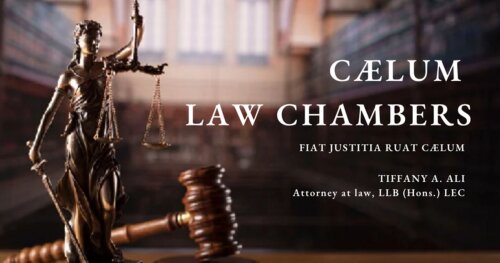Best Lawsuits & Disputes Lawyers in Chaguanas
Share your needs with us, get contacted by law firms.
Free. Takes 2 min.
List of the best lawyers in Chaguanas, Trinidad and Tobago
About Lawsuits & Disputes Law in Chaguanas, Trinidad and Tobago
Lawsuits and disputes law in Chaguanas, Trinidad and Tobago involves the legal framework for resolving disagreements between individuals, businesses, or organizations. This can cover a wide range of issues, including breach of contract, property disputes, personal injury claims, landlord-tenant matters, debt collection, employment issues, and family-related disagreements. Courts in Chaguanas operate under the broader legal system of Trinidad and Tobago, which is based on English common law traditions. Civil lawsuits are typically addressed in the Magistrates’ Court or the Supreme Court, depending on the value and nature of the claim. The goal of this area of law is to provide a fair forum for parties to resolve their disputes when informal negotiations fail.
Why You May Need a Lawyer
There are many scenarios where seeking the assistance of a qualified lawyer in Chaguanas can help protect your rights and interests. Common situations include:
- You are being sued by another party, such as in a contract dispute, and need legal representation.
- You need to file a lawsuit to recover monies owed, return of property, or for damages arising from a personal injury.
- You are embroiled in a dispute with a landlord, tenant, neighbor, business partner, or contractor.
- You have received a legal letter or court document and require advice on how to proceed.
- You are seeking alternative dispute resolution, such as mediation or arbitration, to resolve a matter outside of court.
- You are experiencing employment disputes, such as wrongful dismissal or non-payment of wages.
- You need assistance with family issues like divorce, custody, or division of property.
Having a knowledgeable lawyer can help ensure that your case is properly presented, deadlines are met, evidence is gathered appropriately, and that your rights are aggressively advocated whether inside or outside the courtroom.
Local Laws Overview
The legal system in Trinidad and Tobago, including Chaguanas, is primarily governed by statutes enacted by Parliament, regulations, and precedents from previous court decisions. Some of the key aspects of local laws relevant to lawsuits and disputes include:
- Jurisdiction: Minor civil claims are usually heard in the Magistrates’ Court, while the High Court (a division of the Supreme Court) handles larger or more complex cases.
- Limitation Periods: There are statutory time limits for bringing various types of legal claims, such as personal injury or contract claims, so it is important to act promptly.
- Pre-Action Protocols: In some cases, parties must attempt to settle disputes before legal proceedings may be filed. This could involve formal demand letters or pre-action protocol steps.
- Evidence and Procedure: Civil litigation is governed by the Civil Proceedings Rules, which set out court procedures, disclosure obligations, and rules for presenting evidence.
- Alternative Dispute Resolution: Mediation and arbitration are encouraged as cost-effective alternatives to litigation, and are sometimes ordered by the court.
- Enforcement of Judgments: Successful parties may enforce a judgment through various means, including garnishment, seizure of assets, or other legal remedies provided by law.
These local laws help ensure that civil disputes are resolved efficiently and justly, provided that parties follow the correct legal procedures.
Frequently Asked Questions
What types of civil disputes commonly arise in Chaguanas?
Common disputes include contract disagreements, property boundary issues, personal injury claims, consumer complaints, debt recovery, landlord-tenant disputes, and employment disputes.
How do I start a lawsuit in Chaguanas?
To start a lawsuit, you must file a claim form at the appropriate court, serve the other party with the documents, and then follow the prescribed court procedures. It is advisable to consult a lawyer for proper guidance.
How long do I have to file a lawsuit?
Time limits depend on the type of case. For example, the limitation period for bringing most contract or tort claims is usually four years, but certain claims may have shorter or longer periods. Always seek legal advice early.
What is mediation and can it be used instead of going to court?
Mediation is a voluntary process where a neutral third party helps disputing parties reach a settlement. The courts in Trinidad and Tobago often encourage mediation before proceeding to a full trial.
Can I represent myself in court?
You have the right to represent yourself, but the rules and procedures can be complex. Having a qualified lawyer increases your chances of a favourable outcome and ensures compliance with court requirements.
What happens if I receive a legal notice or summons?
You should read the document carefully and seek legal advice promptly. There are often strict deadlines for responding, and failing to act could result in a default judgment against you.
How are court fees and legal costs handled?
Court fees vary depending on the nature and value of the claim. Legal fees are typically negotiated between you and your lawyer. In some cases, the losing party may be ordered to pay the legal costs of the winner.
What happens after the court gives a judgment?
The losing party is expected to comply with the judgment. If they do not, the successful party can apply for enforcement measures, such as seizing assets, garnishing wages, or other remedies permitted by law.
Are there alternatives to going to court for resolving my dispute?
Yes, alternative dispute resolution methods such as mediation and arbitration are available and often encouraged. These can save time and costs compared to traditional litigation.
How do I find a qualified lawyer in Chaguanas?
You can search for lawyers through local legal directories, recommendations, or by contacting the Law Association of Trinidad and Tobago for referrals.
Additional Resources
If you are seeking guidance or help regarding lawsuits and disputes in Chaguanas, the following organizations and resources may be helpful:
- Law Association of Trinidad and Tobago: The official body that regulates and supports legal professionals, providing lawyer referrals and legal information.
- Legal Aid and Advisory Authority: Offers legal services and representation to those who qualify financially.
- Ministry of the Attorney General and Legal Affairs: Provides public information on laws, legal rights, and justice services throughout Trinidad and Tobago.
- Citizens Advice Bureau: Offers free guidance on legal and other matters affecting residents, including alternative dispute resolution resources.
- Local Courts: Magistrates’ Court and High Court staff can advise on filing procedures and give information about court forms and timelines.
Next Steps
If you believe you are involved in a legal dispute or may need to file or respond to a lawsuit in Chaguanas, consider taking the following steps:
- Gather all documents and evidence related to your issue, such as contracts, receipts, correspondence, photographs, or medical records.
- Write down a clear summary of key events and dates to help explain your situation to a lawyer or advisor.
- Contact a qualified local lawyer who specialises in dispute resolution or the specific area relevant to your case.
- If you face financial difficulties, enquire about legal aid or contact the relevant authority for support.
- Respond promptly to any court documents or legal letters, and never ignore formal notices.
- Explore the possibility of mediation for a faster, more cost-effective solution if appropriate for your case.
Timely legal advice can protect your rights and increase the chances of resolving your dispute efficiently. Taking early action is the best way to safeguard your position and seek a just outcome.
Lawzana helps you find the best lawyers and law firms in Chaguanas through a curated and pre-screened list of qualified legal professionals. Our platform offers rankings and detailed profiles of attorneys and law firms, allowing you to compare based on practice areas, including Lawsuits & Disputes, experience, and client feedback.
Each profile includes a description of the firm's areas of practice, client reviews, team members and partners, year of establishment, spoken languages, office locations, contact information, social media presence, and any published articles or resources. Most firms on our platform speak English and are experienced in both local and international legal matters.
Get a quote from top-rated law firms in Chaguanas, Trinidad and Tobago — quickly, securely, and without unnecessary hassle.
Disclaimer:
The information provided on this page is for general informational purposes only and does not constitute legal advice. While we strive to ensure the accuracy and relevance of the content, legal information may change over time, and interpretations of the law can vary. You should always consult with a qualified legal professional for advice specific to your situation.
We disclaim all liability for actions taken or not taken based on the content of this page. If you believe any information is incorrect or outdated, please contact us, and we will review and update it where appropriate.
Browse lawsuits & disputes law firms by service in Chaguanas, Trinidad and Tobago
Chaguanas, Trinidad and Tobago Attorneys in related practice areas.










